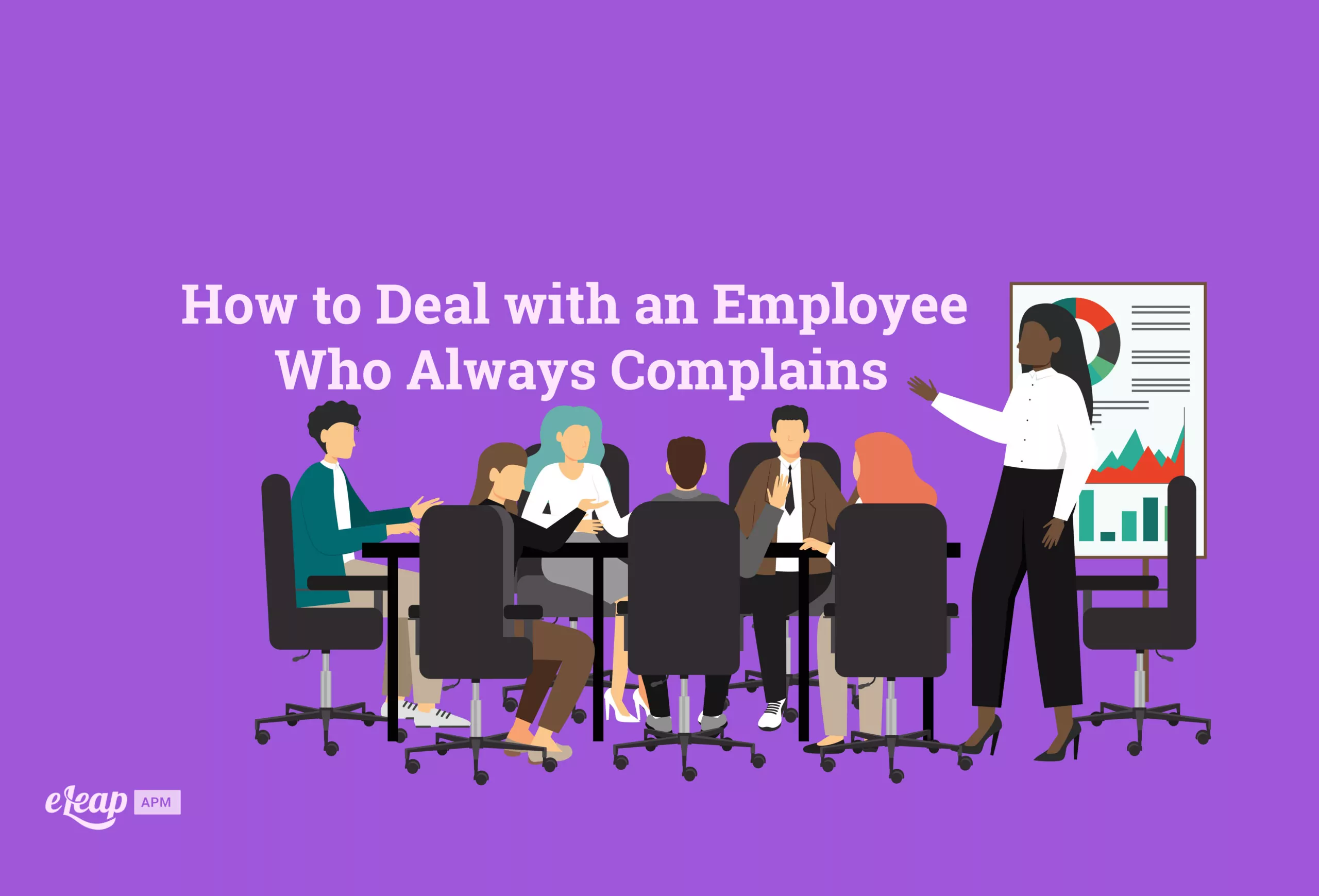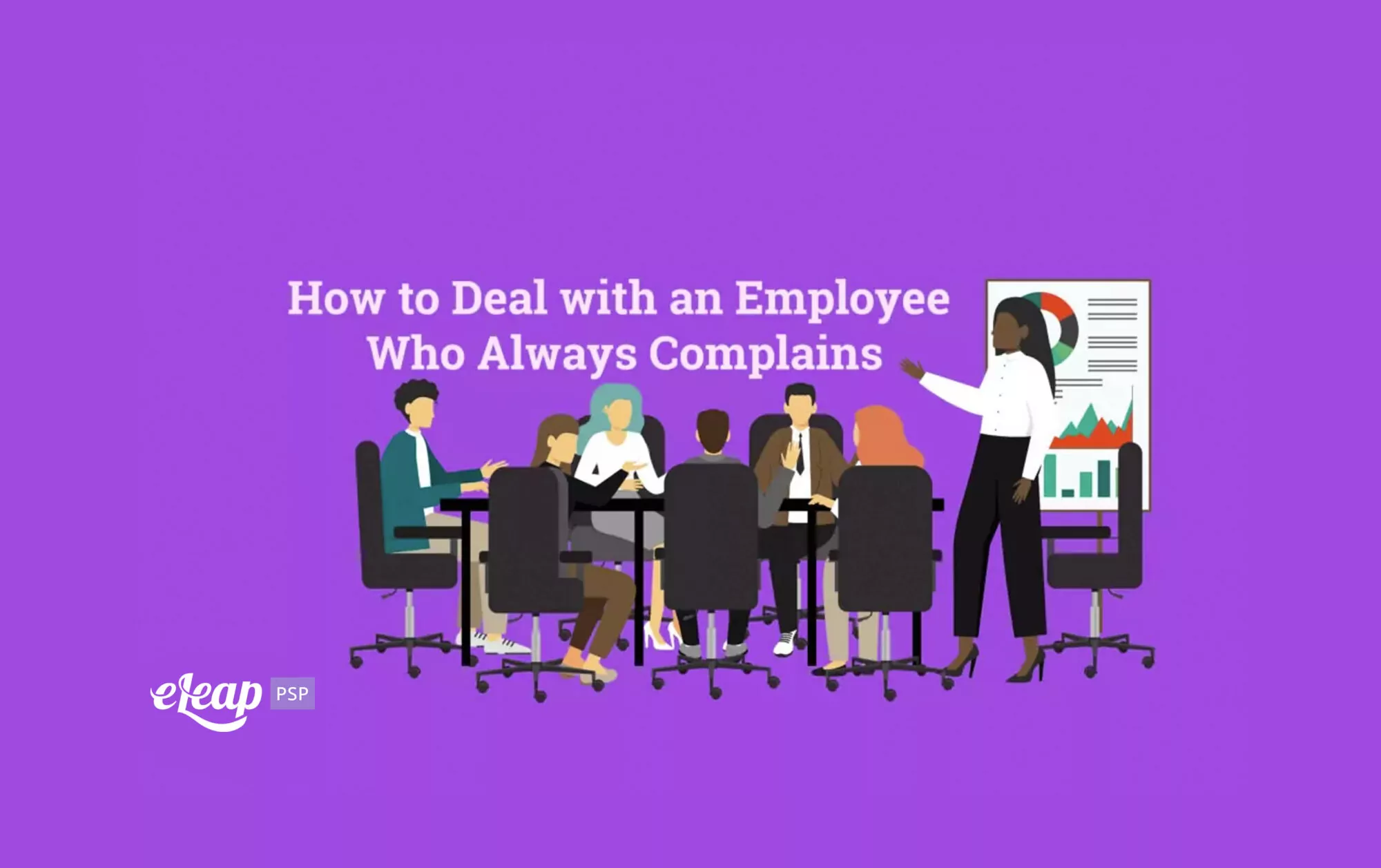How to Deal with an Employee Who Always Complains

Unfortunately, chronic complaining is something that’s all too common within most organizations. As a leader, dealing with employees who complain constantly can be tricky, particularly if they perform well or are good at their job. At some point, most leaders have dealt with an employee who is constantly complaining. A hostile work environment is rarely pleasant, and it is often the result of unpleasant experiences at work. One of the biggest indicators of a hostile work environment is chronic complaining. Explore how eLeaP’s Performance Management Platform can simplify evaluations, boost productivity, and drive measurable results.

In the end, we all complain about something occasionally, but constant complaining in the workplace is toxic. You’re not going to enjoy working with someone who constantly complains and whines. What’s more, neither are your other employees, and you’ll soon notice negativity spreading like wildfire.
Unfortunately, most people make matters worse by adding fuel to the fire or by getting more stressed and irritated. A negative workplace attitude is like a bad cold that spreads no matter how badly you don’t want it to. As a leader, you need to make sure you protect your other employees from negativity and protect company culture. If you work with a chronically complaining employee, there are some steps you can take to improve the situation without adding to the hostility.
Refuse to Play into The Complaining
Whether positively or negatively, a response, play-in, or comment on a complaint may end up validating the complainer. Validating their complaints, nodding along, or giving in to their whining will only escalate the situation.
Generally speaking, people who complain do not complain to themselves. As part of the complaining process, there will always be interactions with others. If an employee complains to you, be polite, but change the subject immediately and don’t engage in the conversation. If the complaints become chronic, it’s time to interject with some management techniques to ensure they don’t get out of hand.
Praise Your Positive Employees
In order to help prevent chronic complaining from becoming an issue that’s swept under the rug, it’s important to praise those employees who do have a positive attitude and don’t tend to complain. Just like with many other situations you’ll come across as a leader, it’s just as important to praise the good as it is to reprimand for the bad. Show your positive employees that their positivity, good attitude, and lack of complaints certainly don’t go unnoticed. Even better, encourage them to spread positivity to fight the negativity. Try eLeaP free for 30 days and see how we can help you increase positivity in your organization.
Start Conversations Yourself
There will be many times when you will interact with your employees in a non-managerial manner. In these instances, do what you need to do to prevent the spread of negativity by ensuring you don’t allow a complainer the opportunity to well… complain. Your grumbling employee should not dominate your conversations. Rather than waiting for others to initiate, be the first to do so. Try to steer any lighthearted conversation away from work whenever possible and maintain a positive tone. Keeping the discussion upbeat and fun will prevent your negative employee from going into the abyss of complaining.
Be Blunt When Needed
In some cases, it is better to be direct, such as by stating that you do not wish to hear complaints. Bear in mind that being blunt does not require rudeness. You can point out directly that hearing complaints is not something you want to engage in without being rude, demeaning, or disrespectful.
Never Stoop to Their Level
With a chronic complainer, it is easy to get swept up in their negativity. The strategy may be especially important if you are stressed or annoyed at work. Do your best to rise above these situations and avoid becoming a complainer. This point is, perhaps, one of the most critical for leaders. It’s all too easy as a leader to find things to get irritated at or complain about yourself. But if leaders start to complain, it’s a dangerous, slippery slope of negativity that’s hard to recover from. Leaders have incredible impacts on work environments, so whatever you do, don’t stoop to your employees’ level.
Keep Casual Interactions Short and Sweet
As a leader, there will be times when you have to engage in casual conversation with employees. In these situations, it’s still important not to fall victim to listening to complaints or giving the impression that you think it’s okay for employees to complain. Be polite and positive, say hello and goodbye, and engage in small talk with them. But you don’t need to engage in lengthy conversations if they start to become negative.
Reprimand As Necessary, When Necessary
If all of the above simply isn’t working and you still have an employee who is a chronic complainer, it’s time to take some action as a manager. The issue is complainers spread negativity, and before you know it, you’ll have an entire office full of people who can’t stop complaining. Your culture will be in trouble, and it’ll be a whole lot harder to fix the situation. When the time comes to reprimand an employee for negativity, do so. It’s best to start by trying to get to the bottom of the situation before taking action. Speak to problem employees to find out what’s wrong and if you can do anything to help them feel happier and more positive at work.
Positive work environments are extremely important. A negative attitude can negatively impact your job satisfaction and employee relations. The best way to stop complaining is to nip it in the bud. You don’t have to put up with chronic complainers! Remember, as a leader, it’s your job to ensure that negativity doesn’t spread around the workplace and that all your employees feel happy and positive.